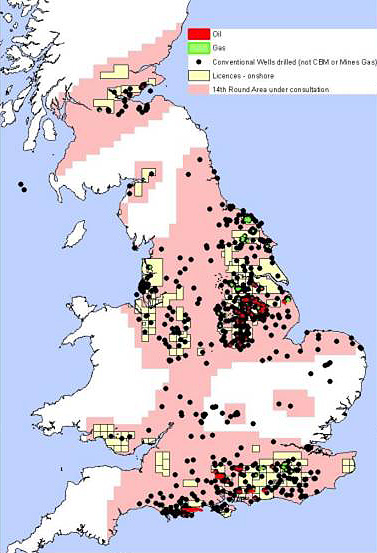It takes something to get groups as diverse as the RSPB, the National Trust, the Angling Trust, the Salmon and Trout Association and the Wildlife Trusts to sit around the same table for weeks on end to hammer out a shared position on a key issue. Perhaps we should thank the frackers of the UK shale gas industry for bringing us together to focus our collective fire on what they have got planned for our countryside?
Here at the Angling Trust we share the concerns of other wildlife groups about the impacts of fracking and the potential for water contamination, close to a range of fragile ecosystems and habitats including our beloved chalk streams. Given that many of the licensed areas are uncomfortably close to the chalk aquifers of southern and eastern England we believe there is a strong case for designating particularly sensitive areas as ‘no frack’ zones. Obviously as anglers and conservationists we are concerned about the health of all our river systems but the English chalk rivers are particularly vulnerable due to the permeable nature of their aquifers.
85% of the worlds chalk streams are located in England and our stewardship of them has been lamentable. Many of these iconic rivers are suffering from over abstraction, habitat destruction, pollution and invasive species. Both our development control and water resource planning processes are woefully inadequate. Chalk aquifers have been over exploited as an easy and cheap source of ready filtered water at the expense of the environment in general and chalk streams in particular. There is an urgent need for abstraction reform and to restrict the depletion of groundwater sources.
As we said in our Charter for Chalk Streams, published last year:
“How can we lecture countries like Brazil, Indonesia and the Democratic Republic of Congo on their lack of care of the world’s rainforests when our own stewardship of the majority of the world’s chalk streams is so poor?”
 And the situation across other catchments gives no reason to suggest that these rivers are capable of withstanding any further shocks to the system that fracking might bring. At the last count we had less than a quarter of all rivers achieving ‘good ecological status’ and over a third of catchments either over abstracted or over licensed for abstraction.
And the situation across other catchments gives no reason to suggest that these rivers are capable of withstanding any further shocks to the system that fracking might bring. At the last count we had less than a quarter of all rivers achieving ‘good ecological status’ and over a third of catchments either over abstracted or over licensed for abstraction.
Rather than doing something positive about this parlous state of affairs in their current Water Bill the government has ducked the opportunity to address demand management through universal water metering, has failed to follow through on promised abstraction reform and is now trying to drive through wholesale fracking without first putting in place the necessary regulatory framework.
‘Are we fit to Frack’ is a serious, peer reviewed study which should be essential reading for every politician, planner and citizen who is either charged with making decisions on fracking sites or who cares about our countryside and wildlife. It is not an anti fracking polemic, in fact we have been accused of being defeatist by one, all too predictable, MP for even countenancing the prospect that fracking might go ahead at some point in the future. No, this is an evidenced based study which draws on the experiences of the USA and elsewhere and lays out sensible pre conditions which must be addressed before fracking is rolled out across our green and pleasant land.
Who can argue against proposed fracking sites being required to have a full environmental impact assessment or for the cost of regulation being met by the industry not the taxpayer? Is anyone seriously suggesting that full transparency of the shale gas industry and its environmental impact is a bad thing or that monitoring and testing of shale gas operations should be anything other than rigorous and independent?
If I was an investor in shale gas, which I’m not, I would want to know that the industry was operating to the highest possible environmental standards. There’s no point politicians and the frackers bleating on about what tough rules we have here in the UK when this is a new industry with new challenges which is seeking to operate in some of the most sensitive locations in our countryside. Furthermore, the current regulatory structure, which is split between four government departments and agencies, was never designed to cope with the demands of up to 30,000 new applications to extract fossil fuels from deep underground shale seams using a process that has the potential, not only to use up precious water resources in already water stressed areas, but which could, without proper oversight, end up discharging polluted waste water into rivers, streams and the groundwater itself.
I don’t think for one moment that we will stop fracking, or even that we necessarily should, but I do think that until we sort out a regulatory regime that is fit for purpose we have to say, loud and clear, that we are simply not yet ‘Fit to Frack’.
You can download a copy of the summary report from the Angling Trust website HERE
This feature forms part of Martin’s Angling Trust Fighting for Fishing blog and is reproduced in an edited form here on FishingMagic with his kind permission.










